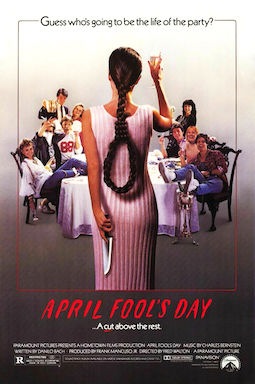April Fool's Day **1/2
Proving that there's a slasher film to be found in every holiday, the makers of Friday the 13th also made April Fool's Day.
During April Fools Day weekend, a bunch of teenagers spend their spring break in a mansion on an island off Cape Cod. But once the final ferry leaves, they find themselves stuck when one of them has a pretty sick sense of humor.
Pretty much this has all been done before, but there's enough freshness here to keep genre fans happy - seeing a slasher film set amongst the preppy Nantucket set is at least novel - but those who aren't fans of this particular subgenre of horror film are likely going to be repulsed by the gore and bored by the lack of character development. Although, to be fair, for it's genre and vintage, you could do a lot worse.
Proving that there's a slasher film to be found in every holiday, the makers of Friday the 13th also made April Fool's Day.
During April Fools Day weekend, a bunch of teenagers spend their spring break in a mansion on an island off Cape Cod. But once the final ferry leaves, they find themselves stuck when one of them has a pretty sick sense of humor.
Pretty much this has all been done before, but there's enough freshness here to keep genre fans happy - seeing a slasher film set amongst the preppy Nantucket set is at least novel - but those who aren't fans of this particular subgenre of horror film are likely going to be repulsed by the gore and bored by the lack of character development. Although, to be fair, for it's genre and vintage, you could do a lot worse.






